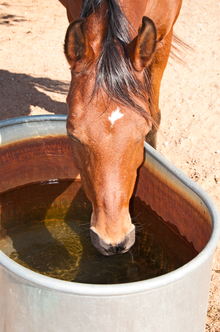During hot summer months horse owners are urged to make sure that horses are getting the water needed to guarantee good health. Water consumption is extremely important in the digestive process to avoid colic impaction, dehydration and other life threatening ailments.

Quenching your horse's thirst
Dehydration in horses is an extremely serious situation and can occur during strenuous exercise, stressful situations, or in cases of diarrhea.
The typical horse weighing 1,000 to 1,200 pounds needs 8 to 10 gallons of water each day just for maintenance, and during strenuous exercise in hot, humid weather when the horse is sweating a great deal, it will need 2 to 3 times more.
A lactating mare producing 3 gallons of milk a day needs at least 75 percent more water per day and during hot weather that need can increase significantly.
Many horses are given access to water only a couple of times a day. Although horses can adapt to this practice, it is not always best for their health and well-being. A horse going without water for a number of hours will begin to become dehydrated and the functioning of his body will begin to decline.
A horse deprived of feed, but supplied drinking water, is capable of surviving 20 to 25 days. A horse deprived of water may live only 3 to 6 days. After lacking water intake for two days a horse may refuse to eat and exhibit signs of colic and other life-threatening ailments.
Water is essential for all metabolic activities and for a number of vital physiological processes including utilization and digestion of nutrients, regulation of body temperature, muscle contraction strength, joint lubrication, and waste elimination.
During summer months, horses are often engaged in more activity than during the colder winter months. This activity leads to the need for more water consumption.
Dehydration in horses is an extremely serious situation and can occur during strenuous exercise, stressful situations, or in cases of diarrhea. The lack of water can include the lack of electrolytes. Electrolytes include the minerals sodium, chloride and potassium and the lack of electrolytes can lead to kidney failure in the horse, if the horse is not rehydrated quickly.
In addition to making sure your horse always access to plenty of fresh, clean, palatable water, you should recognize when your horse is becoming dehydrated and its fluid balances need attention.
Dehydration is often not recognized until 5 percent or more body weight is lost. Signs of dehydration are weakness, depression, sunken eyeballs, dry mucous membranes, slowed capillary refill time, and increased heart rate. Any of these signs mean that your horse should be given clean fresh water and possibly electrolytes to prevent serious dehydration.
